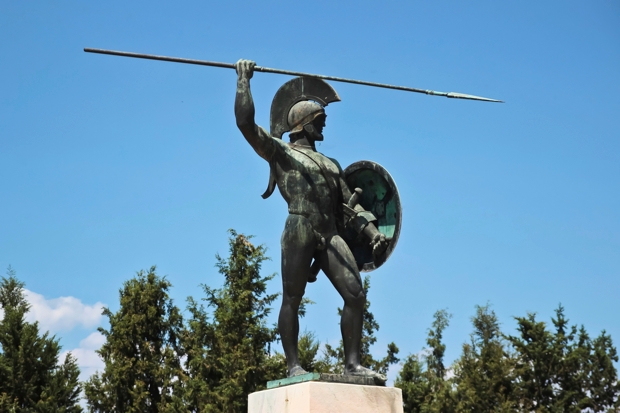As rebels, terrorists, fascists, foreign forces, activists, separatists, militants, militias, nationalist groups, Neo-Nazis, Right Sector forces — take your pick — spread civil war across the increasingly lawless cities of eastern Ukraine, a pro-Russian commander helpfully commented ,‘We have God in our hearts, and they have cockroaches in their brains’.
In 431 bc the so-called ‘Peloponnesian war’ broke out between Athens and Sparta. In 427 bc, pro-Spartan oligarchs attempted to drive pro-Athenian democrats out of Corcyra (Corfu), as a result of which civil war spread rapidly from city to city. It was described with horror by the contemporary historian Thucydides, who imagined war as ‘a schoolmaster in brutality’, with both sides taking lessons from precedents already set to go to far greater extremes of destructiveness.
So men of violence won automatic credibility, and evaluation of actions consequently changed: what in normal circumstances would be called ‘bare-faced insanity’ became ‘staunch manliness’, ‘far-sighted caution’ became ‘a nice way of describing cowardice’, ‘moderation’ became ‘a pretext for gutlessness’ and ‘ability to see all sides of a question’ become ‘total unfitness for action’. ‘Bravery’ became associated with ‘violent reaction’, and ‘deliberation to avoid mistakes’ a ‘simple reason for doing nothing’. Fanaticism was the mark of the real man; his opponent a man to be suspected.
Revenge was more important even than self-preservation, while pacts were made merely to overcome temporary difficulties. Neither justice nor the interests of the people prevented men doing anything to win power by any means, and those who relied on policy rather than brute force were easily destroyed. Conscience was ignored: more attention was given to the man who could justify outrages attractively. Those who remained neutral fell victims to both sides.
From the IRA to Syria and now Ukraine — as Thucydides concluded: ‘so it will always be, while human nature remains the same’.








Comments
Join the debate for just £1 a month
Be part of the conversation with other Spectator readers by getting your first three months for £3.
UNLOCK ACCESS Just £1 a monthAlready a subscriber? Log in